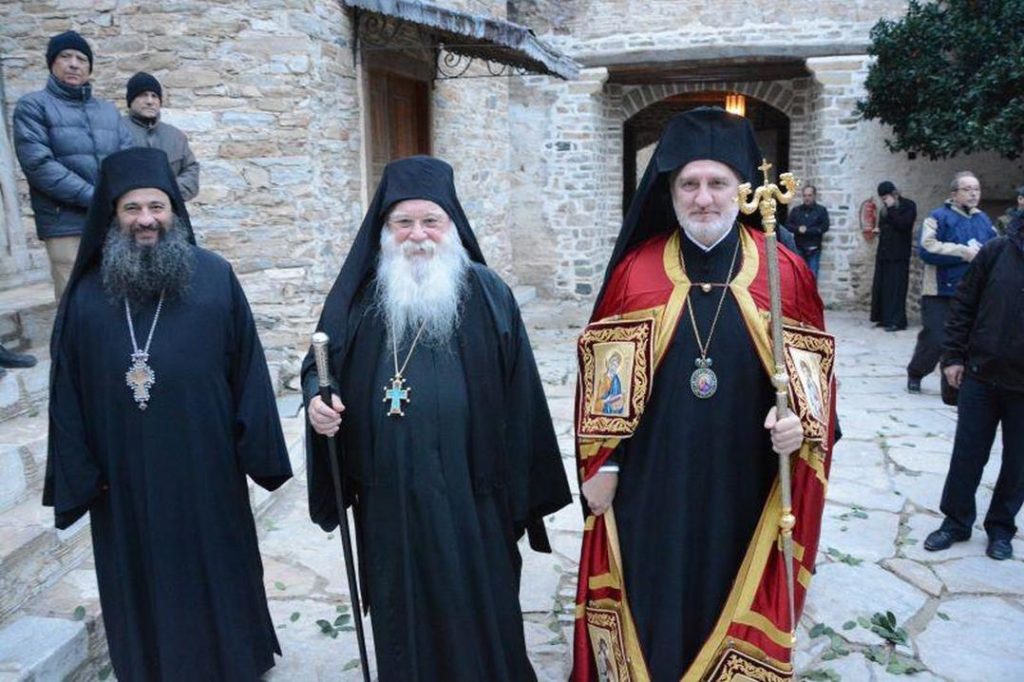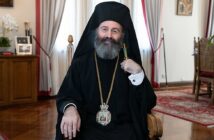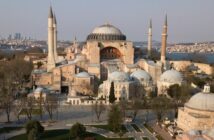Source: Hurriyet Daily News
İpek Yezdani – ISTANBUL

For the first time in history, a Turkish citizen has been chosen as the archbishop of the U.S. to lead the Greek Orthodox Archdiocese of America.
Elpidophoros Lambriniadis, who was born and raised in the Bakırköy district of Istanbul, is chosen to lead all the Orthodox and Greek congregation in the U.S.
A native of Istanbul, Lambriniadis had been serving as the principle of the closed Halki Seminary on Heybeliada, an island off Istanbul’s coast, and teaching as a professor at the Aristotle University of Thessaloniki in Greece. Lambriniadis said he was chosen by the council called “Holy Council’ (Synod) of the Greek Orthodox Church, which consisted of 12 members and led by the Patriarcht Bartholomeos in Istanbul.
“It is the first time in history that a Turkish citizen is chosen as the archbishop of the United States. This has a significant importance for Turkey because the archbishop of the U.S. is the religious leader of all the Greek foundations in the United States. It means he also has a political impact. Therefore this is great opportunity for Turkey because someone who knows Turkey, who understands Turkey and who speaks Turkish is going to lead the Greekcongregation in the U.S., the importance of this, is so obvious,” Lambriniadis told daily Hürriyet in a recent interview.
Lambriniadis said this situation could also serve to improve relations between Turkey, the U.S. and Greece.
“The archbishopric in the U.S. has an open line with the White House constantly. The U.S. government has many times expressed the problems of the Fener Greek Patriarchate in Istanbul in its human rights reports. Starting from the issue of the closed Halki Seminary in Heybeliada, it is not easy to find solutions to these problems in Ankara or Athens. However, there is a much higher possibility of finding a solution to these kind of problems by sitting around the same table in Washington. Especially re-opening the Halki Seminary in Heybeliada would have a very positive impact on U.S.-Turkey relations,” he added.
Lambriniadis said a big ceremony will be held in the Holy Trinity Cathedral in New York on June 22 before he takes on the post. Besides the diplomats of some other countries, he also invited Turkish diplomats to this significant ceremony.
Lambriniadis was born and raised in Bakırköy, recalling the formative days of his youth in the district which has been home to a diverse population.
“I had a very beautiful childhood in Istanbul. We used to play all together as Turkish, Greekand Armenian children. I had wonderful friendships, and we had very good relations with our neighbors. Our next door neighbor, who were a Muslim family, were sharing with us their meat every Feast of the Sacrifice Holiday [Eid al-Adha], and we were sharing with them our Yeast bread and Christmas meal every year. My best friends are still my friends from Bakırköy,” he said.
Lambriniadis said following the events in Cyprus in the 1970’s, they had to flee Greece in 1977 – when he was 10 years old — because of rising reactions toward the Greek population in Istanbul. “It was very hard for us to leave our motherland and move. The Greeks in Greece were mocking us because of our different Greek accent and the children at school were shouting and despising us, saying, ‘You are Turks!” he added.
Having completed his military service in the southern town of İskenderun in Turkey and graduating from the university in Thessaloniki in 1991, Lambriniadis moved to Germany for his master’s studies.
During that time, Patriarch Bartholomew was chosen as the patriarch of Istanbul, triggering a new wave of excitement among the young Greek religious community abroad. “He was the most loved metropolitan bishop, and after his election, I decided to return to Istanbulimmediately. I came back to Istanbul in 1994, I was already a Turkish citizen, therefore following my sanctification as a priest, I did my military service in Ankara and İskenderun,” he added.
When asked where he felt he belonged to the most, Lambriniadis said, “Istanbul, of course!”
“I think my father has had a huge impact on me about Istanbul. Because he never wanted to go to Greece, he never liked it there and he always wanted to return to Istanbul. In 2004, he had a stroke and had said, ‘I don’t want to die in Athens, take me to Istanbul with you.’ You won’t believe me but my paralyzed father started walking again one week after he returned to Istanbul! ‘Well! Bring me a Turkish newspaper and make me a cup of tea, I am going to do a crossword puzzle,’ he had said to me, because he could only solve the crossword puzzles in Turkish! I lost him two years ago, and I buried him in the Bakırköy Greek Cemetery,” Lambriniadis said.
“I am moving to the U.S., but I will be visiting Istanbul often, because my heart remains in Istanbul.”




5 Comments
At a time when Turkey is threatening war by violating daily Greece’s and Cyprus’ territorial waters and air space and is getting ready to drill for natural gas in Cyprus’ EEZ (Exclusive Economic Zone) in the Mediterranean, against the provisions of international law, Elpidophoros takes the “middle ground”, acting more as a U.N. mediator and not at all as a leader of the Greek-American community in the U.S. He mentions the “Cyprus events” of 1974 and the past violations of human rights by Turkey as if we did not re-live last summer, in the horrible ordeal of pastor Andrew Branson, the latest edition of “Midnight Express”… He could claim that he is a religious leader and not a politician, but then why did he choose to talk repeatedly (and he even wrote a book paid by the “Archons”, (i.e. Father Karloutsos) about the geopolitics of the Ukrainian autocephaly?
Nick,
The notion that the Archbishop of the Greek Orthodox Archdiocese of America is a “leader of the Greek American Community” (however you wish to define that term) is a fiction that exists only in the minds of the Greek Foreign Ministry and perhaps some of the readers of The National Herald and Orthodox Observer who still believe that they live in a “diaspora”. It is a fiction that not even the Turkish Government believes, notwithstanding a recent article in a Turkish newspaper.
While the Archbishop is the titular head of the “Archdiocese,” his jurisdiction only extends over the “Direct Archdiocesan District” which is comprised of New York, Connecticut, Washington, D.C., and the Bahamas.
After the dismantling of the Archdiocese by Patriarch Bartholomew and the creation of “Metropolises,” the Archdiocese has no “dioceses” for the Archbishop to preside over. The eight U.S. Metropolitans (Chicago, San Francisco, Pittsburgh, Boston, Denver, Atlanta, Detroit and New Jersey) preside over far greater territories. [The Metropolis of San Francisco, for example, includes all of California, Alaska, Arizona, Hawaii, Nevada, Oregon and Washington.] The Metropolitans report to, and during liturgies, commemorate Patriarch Bartholomew, not the Archbishop.
Until he satisfies the residency and other requirements for U.S. Citizenship, elects to adopt this country as his own and takes the oath of Citizenship, relinquishing any allegiance he might have had to Turkey, Greece or any other foreign country, he can only honestly be said to be the religious leader of the parishes in the Direct Archdiocesan District.
Americans elect their leaders.. from school and library districts to City, County, State and National offices. Historically, Orthodox Christians also elected their Bishops. Perhaps it is a practice that should be revisited, especially in America.
George, I also add that there are many Greek Americans who have little, to no connection with the GOA. Many are not believers and others have embraced other faith traditions. To claim that AB Elpi is leader of the Greek American community is faulty thinking. Hopefully, he is the leader of the Body of Christ under the GOA.
Furthermore, I am repulsed and irritated when I hear the church referred to as the homogenia. My wife is not Greek, many of my friends, who are faithful members of the church have married non-Greeks. This term excludes all who are non Greeks.
JK,
I believe that “Omogenia” is a racist term. It refers to those of the “same race”. It is not representative of the 2nd, 3rd, fourth and fifth generations of descendants of the early immigrants from Greece who built the communities and parishes of the GOA without any assistance from Turkey or Greece. America is the multi-cultural, multi-ethnic home of those descendants, not a “diaspora”. Another term that is not representative of those who have made America their home.
Hierarchs who are foreign-born and who report to synods in the Old World are ill equipped to minister to the flocks entrusted to their care. They are “diasporists”, who believe that they are the political as well as religious “leaders” of a homogeneous ethnic ghetto of fellow diasporists.
The late Fr. Peter Gillquist, of blessed memory (an Advisory Board member of OCL), preached that the goal of the Church is to “make America Orthodox”. The Hierarchs of the GOA, appointed by the Holy Synod of the the Patriarchate in Istanbul (formerly Constantinople) seem to believe that their fundamental mission in America is to keep the Church as the prime, if not sole, conservator of Greek ethnic identity. That is, to keep the “One, Holy, Catholic and Apostolic Church” in America “Greek”.
This emphasis on ethnic identity has distracted the GOA from its primary mission, with predictable and disastrous results.
God willing, the hierarchy will realize that now is the time to make the individual sacrifices necessary to create a fully unified, mature, American Orthodox Church. It’s the right thing to do.